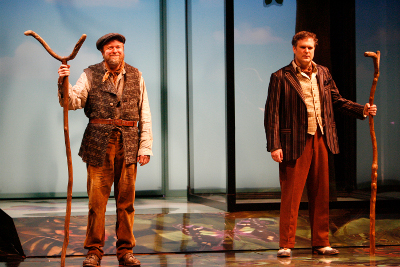As You Like It at the Stratford Festival 2010
I went with some friends to see As You Like It at the Stratford Shakespeare Festival this weekend.
I now have a new favourite scene of that play. It is the one where Touchstone (the court jester who fled with Celia and Rosalind) and Corin (I’ll call him Sheppard Dude) are talking to each other (Act 3 Scene 2). Ben Carlson, who was playing Touchstone, and Randy Hughson, who was playing Sheppard Dude, stood still, in the middle of the stage, looking out at the audience as if watching the sheep in a landscape. I don’t know how he did it, but there was something in Touchstone’s expression and posture that just said “I can’t believe I’m here looking at sheep. I now have a job that’s about as exciting as watching paint dry, except that it’s greasier and smellier and sweatier.” It wasn’t an angry bitter thing. More like incredulous and amusedly resigned. I couldn’t see the Sheppard Dude’s expression as well as Touchstone’s, because of where I was sitting, but he looked happier, content with the world, grinning widely. The two of them just stood there in silence for about a minute, not saying anything, holding their forked (sheep-driving?) walking sticks, and it was the funniest scene in the play. I was already laughing and laughing, and so was a lot of the rest of the audience, and then the sheep bleeting sounds started, from the speakers hidden at the edges of the stage and that made it even funnier. I’m still laughing as I think about it to write this. I’m not sure I can convey how funny it was with words. You might just have to see it to appreciate it. Then, when the Sheppard Dude’s line is something like “So, how do you like the shepparding business?” you just know how Touchstone feels about it. You know already how unimpressed he is with the whole thing. So that one line is made from a bland conversation opener into something that escalates the joke that’s already happening. Then when Touchstone dryly asks Sheppard Dude about his philosophy, you can see how he’s making jokes and banter to amuse himself while out in the sheep field. There’s a motivation in there, and some empathy for the characters, not just a bunch of jokes that seem to come out of nowhere to liven up the play.

Randy Hughson (left) as Corin and Ben Carlson as Touchstone in As You Like It. Photography by David Hou. Image property of Stratford Shakespeare Festival
Ben Carlson is absolutely amazing as Touchstone. He stole every scene he was in. I don’t think I’ve seen one of Shakespeare’s clowns played to be so funny. I usually appreciate the jokes in a Shakespeare play, but feel like some of them are lame, and even the funny ones don’t usually have me doubling over in laughter for minutes at a time. I often get the feeling that we’re supposed to be partly laughing at the clowns, instead of laughing with them. Carlson’s Touchstone came off as intelligent, aware, and made even the jokes that I’d usually think were a bit lame hilariously funny. According to my friends, who know less Elizabethan innuendo than I do, he made the innuendo clear too. For example, Touchstone’s speech about whether it’s better to be single or to be married and “wear the horns” (which is slang for being cuckolded) came through clearly to them, whereas I think I was the only one laughing when Rosalind made her speech about how a snail is considerate to women’s honor because it always wears horns, or when the guy was lifted up on the lords’ shoulders during one of the songs, wearing antlers because supposedly his father and his grandfather had worn horns, so now it was a family tradition.
The naughtiest, funniest piece of innuendo, to me, was when Touchstone was making fun of Orlando’s poetry to Rosalind and making up his own rhymes. His own rhymes were so much better, and wittier, and I think that came across because of the way he said them. When he said “Winter garments must be lined, so must slender Rosalind,” my friend and I looked at each other like “Did he just say that? Did that mean what I think it meant?” and cracked up. His hand gesture for that one was something like, with his fingertips and thumb tip pressed together pointing in the same direction he sort of moved his arm, twisting upward, like the tips of his fingers were burrowing upward into something. At least that’s the mental image I have of it; it happened so fast, I might be wrong. His patter for the rhymes was so quick that you didn’t finish laughing from one when boom, you were hit with the next one, and yet each one was clear and understandable.
Another thing I liked about the production was the way that they made all of the songs modern jazz-like pieces, with some of the techniques that make watching a musical interesting. A lot of the time when a song comes up in a Shakespeare play, they have some guy with a guitar or lute droning on in an Elizabethan sort of way, and I often don’t hear what the words are, and I think to myself “Why are we even doing this? Why is it here?” In this production, even the hey nonny nonnies made some sense because they treated them almost like jazz scat. I liked the song segments in this show, which I’m usually at best ambivalent toward in a Shakespeare play. Good thing too, since music seems to be a significant part of the play.
Another thing I noticed was how many of the characters silently reacted to what another character was saying, and so totally changed the context of the scene. I hadn’t seen a stage production of As You Like It before. I had only listened to the Librivox recording of it. Librivox is a volunteer-run project to make public-domain audiobooks. They have a full cast recording of it, downloadable as MP3 files. I liked it more than I have liked a lot of professional full cast recording of Shakespeare plays. I’m not sure why, but I felt more engaged by it. The women who read the parts of Rosalind and Celia were especially good. The guy with an Indian accent, who I couldn’t understand, was memorable in his own way. It was more amusing than annoying, since he didn’t have many lines. From listening to this version of the play, I had imagined that Celia was more or less cheering Rosalind on for the entire play. She makes a speech at the beginning about how they are like sisters to one another and love one another, and she seems supportive and pleased when Rosalind comes up with the cross-dressing plan, so I just sort of assumed that she felt more or less the same way while Rosalind was getting Orlando to pretend to court her.
In the Stratford production I just saw, however, Celia’s facial expressions and posture during pretty much any of Rosalind’s conversations with Orlando register shock, exasperation, disapproval, and amusement. She rolls her eyes, or goes to sit and wait it out. By the time she says basically “stop trash talking women” to Rosalind in Act 4, Scene 1, you already know how she feels about the whole charade, and you can almost feel the exasperation oozing out of her.
Cara Ricketts, who played Celia, was excellent. I’d seen her last year in A Midsummer Night’s Dream. I really liked what she did on stage. Celia’s relationship with Rosalind is arguably the centre of the play, and it was clear that Ricketts, and Andrea Runge, who played Rosalind, are strong actors who can carry it off, even in unexpected (at least to me) directions.
It wasn’t just the actor who played Celia who did the silent reaction or commentary sort of thing, though. Most of the actors silently reacted to what the person who was speaking said, in one way or another. Another memorable moment came when the woman Touchstone was courting, Audrey, played by the excellent Lucy Peacock, saw Touchstone go over to play the double bass during one of the songs, and her mouth fell open as she leaned forward. She managed to convey “I had no idea he could do this! I can’t believe I am marrying such an amazing man!”
I liked the set design too. There was a giant green apple that came down and hovered in the air. I’m not quite sure what that was about, but it seemed cool. There was a tree behind the stage to indicate the forest, in the forest scenes, that got flowers and leaves on it as time progressed in the play. At intermission, we saw a stage hand picking up white specks from the stage and putting them into a cardboard box that said “Used Snow”. The stage at the start was presumably the reigning Duke’s room, and had four globes in it. Why four? My friend quipped that it must be that when you rule the world you have to be able to see it at all angles from a single spot.
It wasn’t exactly set design, but there were people dressed up as trees and sinuously swaying, with flowers covering their heads including their faces. And there was a lioness who sort of stood around during the lioness story, and had a sexy walk when she left.
All in all, I had a great time, and would recommend going to see the play. This production runs April 30, 2010, to October 31, 2010, at the Festival Theatre at the Stratford Shakespeare Festival, in Stratford, Ontario, Canada. They have a bunch of other plays running too, including The Tempest, with Christopher Plummer, that promises to be spectacular.
The Stratford Festival website has a lot of supplemental information about the play, which can often be interesting. For example, they have Youtube videos of the director, Des McAnuff, talking about the play, an interview with the scene designer, and a production clip that shows the music. They have a study guide for As You Like It, study guides for other plays, and other materials for teachers, including a Shakespearean Insult game, with a list of insults in As You Like It. There is a blog by their archivist, and various other info including schedules for garden tours, backstage tours, chats with cast members, lectures, and concerts.
